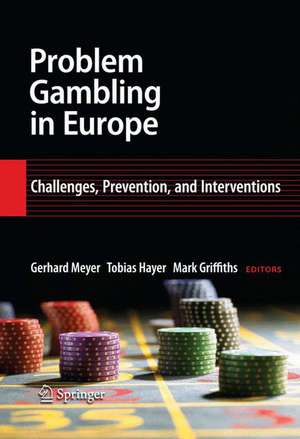Problem Gambling in Europe: Challenges, Prevention, and Interventions
Editat de Gerhard Meyer, Tobias Hayer, Mark Griffithsen Limba Engleză Hardback – 16 dec 2008
Challenges, Prevention, and Interventions
Edited by Gerhard Meyer, University of Bremen, Germany
Tobias Hayer, University of Bremen, Germany
Mark Griffiths, Nottingham Trent University, United Kingdom
As a leisure activity, gambling dates back to ancient times. More recently, the surge in avenues for gambling—casinos, sports betting, lotteries, and remote media (e.g.,Internet, mobile phone, interactive television) among them—finds growing numbers of people losing control over their gambling behaviour, usually at great personal and financial expense. Problem Gambling in Europe is the first book to offer a robust international knowledge base compiled by an interdisciplinary panel of researchers in gambling behaviour.
Reports from 21 countries throughout Western, Eastern, Northern, and Southern Europe reveal wide variations in types of wagering activities, participation by populations, social and criminal consequences related to pathological gambling, the extent to which governments acknowledge the problem, and efforts to control it (often with the involvement of the gaming industries). For each country, noted experts discuss:
- Current legislation regulating gambling.
- Forms of gambling and their addictive potential.
- Participation rates and demographics.
- Prevalence of pathological gambling.
- National policies to address problem gambling.
- Prevention strategies and treatment methods.
Preț: 1109.59 lei
Preț vechi: 1167.99 lei
-5% Nou
Puncte Express: 1664
Preț estimativ în valută:
212.33€ • 219.38$ • 176.63£
212.33€ • 219.38$ • 176.63£
Carte tipărită la comandă
Livrare economică 19 martie-02 aprilie
Preluare comenzi: 021 569.72.76
Specificații
ISBN-13: 9780387094854
ISBN-10: 0387094857
Pagini: 333
Ilustrații: XXX, 335 p.
Dimensiuni: 178 x 254 x 23 mm
Greutate: 0.8 kg
Ediția:2009
Editura: Springer
Colecția Springer
Locul publicării:New York, NY, United States
ISBN-10: 0387094857
Pagini: 333
Ilustrații: XXX, 335 p.
Dimensiuni: 178 x 254 x 23 mm
Greutate: 0.8 kg
Ediția:2009
Editura: Springer
Colecția Springer
Locul publicării:New York, NY, United States
Public țintă
Professional/practitionerDescriere
Problem Gambling in Europe
Challenges, Prevention, and Interventions
Edited by Gerhard Meyer, University of Bremen, Germany
Tobias Hayer, University of Bremen, Germany
Mark Griffiths, Nottingham Trent University, United Kingdom
As a leisure activity, gambling dates back to ancient times. More recently, the surge in avenues for gambling—casinos, sports betting, lotteries, and remote media (e.g.,Internet, mobile phone, interactive television) among them—finds growing numbers of people losing control over their gambling behaviour, usually at great personal and financial expense. Problem Gambling in Europe is the first book to offer a robust international knowledge base compiled by an interdisciplinary panel of researchers in gambling behaviour.
Reports from 21 countries throughout Western, Eastern, Northern, and Southern Europe reveal wide variations in types of wagering activities, participation by populations, social and criminal consequences related to pathological gambling, the extent to which governments acknowledge the problem, and efforts to control it (often with the involvement of the gaming industries). For each country, noted experts discuss:
Challenges, Prevention, and Interventions
Edited by Gerhard Meyer, University of Bremen, Germany
Tobias Hayer, University of Bremen, Germany
Mark Griffiths, Nottingham Trent University, United Kingdom
As a leisure activity, gambling dates back to ancient times. More recently, the surge in avenues for gambling—casinos, sports betting, lotteries, and remote media (e.g.,Internet, mobile phone, interactive television) among them—finds growing numbers of people losing control over their gambling behaviour, usually at great personal and financial expense. Problem Gambling in Europe is the first book to offer a robust international knowledge base compiled by an interdisciplinary panel of researchers in gambling behaviour.
Reports from 21 countries throughout Western, Eastern, Northern, and Southern Europe reveal wide variations in types of wagering activities, participation by populations, social and criminal consequences related to pathological gambling, the extent to which governments acknowledge the problem, and efforts to control it (often with the involvement of the gaming industries). For each country, noted experts discuss:
- Current legislation regulating gambling.
- Forms of gambling and their addictive potential.
- Participation rates and demographics.
- Prevalence of pathological gambling.
- National policies to address problem gambling.
- Prevention strategies and treatment methods.
Cuprins
Belgium.- Denmark.- Estonia.- Finland.- France.- Germany.- Great Britain.- Hungary.- Iceland.- Italy.- Lithuania.- The Netherlands.- Norway.- Poland.- Romania.- Russia.- Slovak Republic.- Slovenia.- Spain.- Sweden.- Switzerland.
Recenzii
"...this book provides a clear and highly informative snapshot of the current gambling situation as it pertains to the European context. ...[provides] readers with a strong foundation to better understand the social climate, regulatory practices and costs and benefits associated with gambling. ...this is a highly recommended book that fills a unique void in the gambling literature through its provision of informative and interesting data on the European gambling market and its emphasis on gambling and problem gambling."
- Alex Blaszczynski, PhD, International Gambling Studies, Vol. 9, No. 2, August 2009
"This new publication is an extremely useful work, and the editors and publishers are to be congratulated for providing such a comprehensive and informative reference piece on not only problem gambling issues in Europe, but on other aspects of gambling as well..."
- Peter Collins, Journal of Gambling Issues: Issue 23, June 2009
"This book is extremely important, a “must have”... One of the best I’ve seen in the past 20 years that I have been working in this field."
- Pieter Remmers, European Association for the Study of Gambling, www.easg.org
- Alex Blaszczynski, PhD, International Gambling Studies, Vol. 9, No. 2, August 2009
"This new publication is an extremely useful work, and the editors and publishers are to be congratulated for providing such a comprehensive and informative reference piece on not only problem gambling issues in Europe, but on other aspects of gambling as well..."
- Peter Collins, Journal of Gambling Issues: Issue 23, June 2009
"This book is extremely important, a “must have”... One of the best I’ve seen in the past 20 years that I have been working in this field."
- Pieter Remmers, European Association for the Study of Gambling, www.easg.org
Notă biografică
Dr. Gerhard Meyer, Professor at the Institute of Psychology and Cognition Research at the University of Bremen (Germany), has been the principal investigator of several research projects dealing with problem gambling and delinquency, neuroendocrine response to casino gambling, brief intervention for problem gamblers and the addictive potential of different gambling forms. He also served as a consultant for national regulators as well as the gambling industry and acted as forensic expert witness in court cases.
Tobias Hayer is a psychologist and received his diploma in 2001. Since 2001, he is working as a research assistant at the Institute of Psychology and Cognition Research at the University of Bremen (Germany). Tobias Hayer conducts research on issues related to problem gambling and school violence. Currently, he is completing his doctoral dissertation on adolescent problem gambling.
Dr. Mark Griffiths is a Chartered Psychologist and Professor of Gambling Studies at the Nottingham Trent University (England). He has published numerous research articles, book chapters and a couple of books on gambling and has been keynote speaker at some of the most important international gambling conferences. Mark Griffiths also served as a member on a number of national gambling committees and advised many governments around the world. He has also won seven national and international awards for his research.
Tobias Hayer is a psychologist and received his diploma in 2001. Since 2001, he is working as a research assistant at the Institute of Psychology and Cognition Research at the University of Bremen (Germany). Tobias Hayer conducts research on issues related to problem gambling and school violence. Currently, he is completing his doctoral dissertation on adolescent problem gambling.
Dr. Mark Griffiths is a Chartered Psychologist and Professor of Gambling Studies at the Nottingham Trent University (England). He has published numerous research articles, book chapters and a couple of books on gambling and has been keynote speaker at some of the most important international gambling conferences. Mark Griffiths also served as a member on a number of national gambling committees and advised many governments around the world. He has also won seven national and international awards for his research.
Textul de pe ultima copertă
Problem Gambling in Europe
Challenges, Prevention, and Interventions
Edited by Gerhard Meyer, University of Bremen, Germany
Tobias Hayer, University of Bremen, Germany
Mark Griffiths, Nottingham Trent University, United Kingdom
As a leisure activity, gambling dates back to ancient times. More recently, the surge in avenues for gambling—casinos, sports betting, lotteries, and remote media (e.g.,Internet, mobile phone, interactive television) among them—finds growing numbers of people losing control over their gambling behaviour, usually at great personal and financial expense. Problem Gambling in Europe is the first book to offer a robust international knowledge base compiled by an interdisciplinary panel of researchers in gambling behaviour.
Reports from 21 countries throughout Western, Eastern, Northern, and Southern Europe reveal wide variations in types of wagering activities, participation by populations, social and criminal consequences related to pathological gambling, the extent to which governments acknowledge the problem, and efforts to control it (often with the involvement of the gaming industries). For each country, noted experts discuss:
Challenges, Prevention, and Interventions
Edited by Gerhard Meyer, University of Bremen, Germany
Tobias Hayer, University of Bremen, Germany
Mark Griffiths, Nottingham Trent University, United Kingdom
As a leisure activity, gambling dates back to ancient times. More recently, the surge in avenues for gambling—casinos, sports betting, lotteries, and remote media (e.g.,Internet, mobile phone, interactive television) among them—finds growing numbers of people losing control over their gambling behaviour, usually at great personal and financial expense. Problem Gambling in Europe is the first book to offer a robust international knowledge base compiled by an interdisciplinary panel of researchers in gambling behaviour.
Reports from 21 countries throughout Western, Eastern, Northern, and Southern Europe reveal wide variations in types of wagering activities, participation by populations, social and criminal consequences related to pathological gambling, the extent to which governments acknowledge the problem, and efforts to control it (often with the involvement of the gaming industries). For each country, noted experts discuss:
- Current legislation regulating gambling.
- Forms of gambling and their addictive potential.
- Participation rates and demographics.
- Prevalence of pathological gambling.
- National policies to address problem gambling.
- Prevention strategies and treatment methods.
Caracteristici
First comprehensive survey of gambling psychology and gambling regulation across Europe





